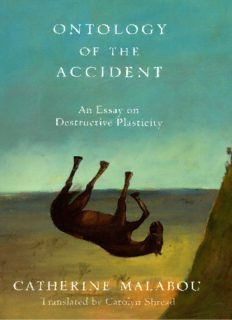
The Ontology of the Accident: An Essay on Destructive Plasticity PDF
Preview The Ontology of the Accident: An Essay on Destructive Plasticity
O N T O L O G Y O F T H E A C C I D E N T An Essay on Destructive Plasticity CATHERINE MALABOU Translated by Carolyn Shread Ontology of the Accident An Essay on Destructive Plasticity CATHERINE MALABOU Translated by Carolyn Shread polity First published in French as Ontologie de l'accident © Éditions Léo Scheer, 2009 This English edition © Polity Press, 2012 Polity Press 65'Bridge Street Cambridge CB2 1UR, UK Polity Press 350 Main Street Malden, MA 02148, USA All rights reserved. Except for the quotation of short passages for the purpose of criticism and review, no part of this publication may be reproduced, stored in a retrieval system, or transmitted, in any form or by any means, electronic, mechanical, photocopying, recording or otherwise, without the prior permission of the publisher. ISBN-13: 978-0-7456-5260-3 ISBN-13: 978-0-7456-5261-0 (pb) A catalogue record for this book is available from the British Library. Typeset in 11 on 15 pt Adobe Garamond by Toppan Best-set Premedia Limited Printed and bound in Great Britain by the MPG Books Group Limited The publisher has used its best endeavors to ensure that the URLs for external websites referred to in this book are correct and active at the time of going to press. However, the publisher has no responsibility for the websites and can make no guarantee that a site will remain live or that the content is or will remain appropriate. Every effort has been made to trace all copyright holders, but if any have been inadvertently overlooked the publisher will be pleased to include any necessary credits in any subsequent reprint or edition. For further information on Polity, visit our website: www.politybooks.com “We must accept the introduction of the aléa as a cate gory in the production of events. There once more we feel the absence of a theory enabling us to think the relations between chance and thought.” Michel Foucault, “The Order of Discourse” Translators’ prefaces, more often than not, are designed to parry accidents of translation. Yet, rather than excusing myself or warning readers about discrete glitches or fault lines running through this English version of Catherine Malabou’s text, in this brief preface I would like instead to think of translation itself as accident. What if transla tion were to accept the accident as its condition, its condition of possibility, its possibility? And what if the change of course that may occur to any text in translation were understood as a change beyond difference? Putting aside the equation of similarities and differences, the plastic equilibrium between a giving and a receiving of form, the accident that lies beyond difference is, I have come to understand in translating Malabou’s Ontology of the Accident, the ontology of translation. Translation is often parsed in terms of a positive plas ticity that gives and receives form, that modifies, meta- morphosizes, transforms or mutates, along with the host of attendant gains and losses. By contrast, an accidental translational ontology assumes also destructive plasticity, an explosive plasticity that evokes fear and is used to vi 1 justify security measures and normative strictures that seek to delimit the field of translation, and against which translation studies butts its head time and again. Yet far from protecting against accident, it may be that the conventionaT^rotocols that aspire above all to neutrality in translation are those that are responsible for its most serious accidents, by splitting the translators reason from her affects. That translation is prone to accidents, bound as it is to a degree of destruction, accounts for its poor status and the widespread deprecation of this form of writing. Generally, we put up with translation from necessity; what if instead we delve into the pleasures of departure . . . O Rumeurs et Visions! Départs dans l’affection et le bruit neufs ! (Rimbaud) . . . for whatever precautions are taken, the change that translation practices is always liable to uncover the uncanny, the change that unsettles identity, inspiring horrified fascination, ridicule or repulsion. As it happens, in Malabous Ontology of the Accident, we experience this same discomfort - even in the French. In her steely confrontation of the disconcerting power of being to change, Malabou calls readers to envisage their own possible accident, the transformation that leaves them dumb and disoriented, departed. Drawing on lit- vm Translator's Preface erature as an ally willing to face the decomposition and regeneration that ontology describes - the ontology in which being is becoming - Malabou explores areas where we hesitate to tread except in the company of trusted guides, or from the shelter of the text. As I followed her again in this third translation, my art moved beyond the difference that is but an extension of identity to meet the possibility of its accident. The explosive accident is terrifying, terrible. And yet, as Malabou points out, the possibility of such accidents is with us at every moment of our lives. However much our course is mapped, there is always the chance of the freak event or minor detour that reroutes us. Much as we wish for a translation that would never trip up, a translation lying seamlessly next to its source, to take on a translation is to take on the accident. Because translation is so closely enmeshed in the ontology of the accident, eventually, thanks to Malabou’s unpacking of this ontology, we may come to acknowl edge that translating has something to offer beyond a means to an end. An embracing of translation as a prac tice that goes beyond pragmatics could alter the voice of translators as mediators of change. Translation might then assume its ontology as a valid mode of being in the world - a mode of being that is becoming. Carolyn Shread IX
Description: